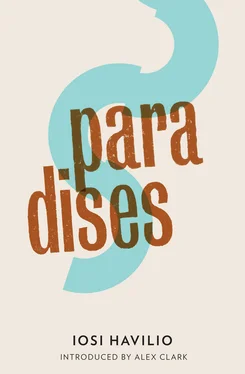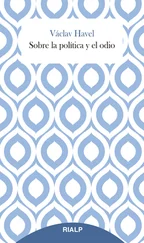Iosi Havilio - Paradises
Здесь есть возможность читать онлайн «Iosi Havilio - Paradises» весь текст электронной книги совершенно бесплатно (целиком полную версию без сокращений). В некоторых случаях можно слушать аудио, скачать через торрент в формате fb2 и присутствует краткое содержание. Год выпуска: 2013, Издательство: And Other Stories, Жанр: Современная проза, на английском языке. Описание произведения, (предисловие) а так же отзывы посетителей доступны на портале библиотеки ЛибКат.
- Название:Paradises
- Автор:
- Издательство:And Other Stories
- Жанр:
- Год:2013
- ISBN:нет данных
- Рейтинг книги:3 / 5. Голосов: 1
-
Избранное:Добавить в избранное
- Отзывы:
-
Ваша оценка:
- 60
- 1
- 2
- 3
- 4
- 5
Paradises: краткое содержание, описание и аннотация
Предлагаем к чтению аннотацию, описание, краткое содержание или предисловие (зависит от того, что написал сам автор книги «Paradises»). Если вы не нашли необходимую информацию о книге — напишите в комментариях, мы постараемся отыскать её.
is an almost perfect novel." — Albert Camus's
reimagined with a female lead in in twenty-first-century Buenos Aires.
Recently widowed, a young woman leaves the countryside for Buenos Aires with her four-year-old son where she seeks to build a new life for herself. She finds work in the zoo and moves into the human zoo of a squatted tower block at the invitation of one of its residents, to whom she acts as nurse, giving morphine injections.
Paradises — читать онлайн бесплатно полную книгу (весь текст) целиком
Ниже представлен текст книги, разбитый по страницам. Система сохранения места последней прочитанной страницы, позволяет с удобством читать онлайн бесплатно книгу «Paradises», без необходимости каждый раз заново искать на чём Вы остановились. Поставьте закладку, и сможете в любой момент перейти на страницу, на которой закончили чтение.
Интервал:
Закладка:
Simón takes a step forward and Benito greets him by inclining his heavy head. Surreptitiously, firmly but without causing a flap, surprised by the ogre boy’s features which from his perspective must seem even more giant and deformed than they are, he grabs on to my leg and hides. If I were someone else, if I believed in signs, in children’s intuition, I would think it a bad omen, that this move isn’t a good idea. It’s fine, but keep an eye on him, I’m fed up with the little shits, one day I’m going to tell them all to bugger off, says Tosca. She chews and adds: Beni, take them up to seven.
We follow the hulking mass up the stairs and on the third floor he guides us along the corridor to a flat with just one room, almost bare. Two rolled-up foam mattresses and a wardrobe that looks too important for so few square metres. A bulb with no shade does too good a job of illuminating everything. On an old sewing-machine table there’s a portable stove connected to a cylinder by a rubber hose. For water, says Benito in his friendly monster’s voice, use the bucket, and he points to a paint-stained one under the bathroom basin.
The first night I barely sleep. Or not at all, I can’t be sure. I stay awake with my eyes closed, simulating sleep. On the alert. Getting accustomed to the noises that lead me towards dawn: shouts, screeches, slamming, fights, telephones that no one answers. I can hear the rumble of several superimposed conversations, real, televised, barely discernible. And suddenly, a voice that detaches itself from the rest: shit, whore, honey, c’mon, Beto . The murmur quickly returns to the level of a muffled but permanent presence. The outside world also makes itself heard: brakes, engines, footsteps, explosions and sirens.
But the thing that keeps me from sleep more than anything, adding to the insomnia of recent days, is not the noise from the street or the music or the conversations, but those strange murmurs produced in the bowels of the building and which at times I think might be in my head. Metallic sounds, wind-like, flushes, hums, sputters, like the secretions of a decomposing organism. And although I could guess at the origin, broken pipes, perforated vents, dying electrical appliances, the fact is that all together they compose a striking, overwhelming echo that’s impossible to ignore.
And yet, despite the filth, the heat, those intestinal noises, and the smell of shit that rises in waves, at some point in the early hours Canetti’s words from the first time he brought me here come to mind: We’re safe here. I even babble them to myself, to confirm it. And so I relax and rest a bit, although still without sleeping. On the third day I cover the windows with black bin bags to prolong the night.
It takes me a while to understand this strange community, to get used to certain codes, at least the most basic ones. There’s a system of hierarchy that I’m picking up through observations and comments. Within the group, some top dogs quickly come to the fore, privileged folk who delegate routine tasks to others. Among the most famous are Perico, el Buti’s younger brother, who does what he wants: Whatever the hell he feels like, says Canetti; the famous Mercedes, a man feared by everyone; Tosca, of course; and a transvestite called Eva who lives alone on the top floor.
There is a series of guidelines for coexistence that, over the first few days, Canetti and Benito will take it upon themselves to reveal to me. The former, too longwinded, his friendliness always ambiguous, the other quite the opposite, rustic, almost caveman-like. In el Buti the rules are meant to impose order, but in many cases they are also linked to resistance. One mistake could end it all, Canetti explains to me, and adds: Eviction is just round the corner. Those guys are a bunch of shysters, Tosca tells me one night when I’m trying to elicit a bit of history from her, but she leaves me hanging. She mentions her father, some wasteland, the construction company, a rogue engineer and a bankruptcy request. I also find out that there’s a judicial order that has been pending for something like ten years but that no one wants to carry out a violent eviction. You have to ask permission to bring people from the outside, give some notice. Not just anyone comes in here, girl, you have to keep an eye out, and to keep an eye out, you have to know, Tosca tells me, slashing the air with her index finger to leave me in no doubt. Entries and exits are certainly monitored. Just in case, Canetti clarifies.
Tosca takes care of the electricity. Before, everyone worked it out for themselves, they hooked up to the building on the corner, the Chinese supermarket or the convent school that occupies half the block. But inspections began to take place much more often and things got complicated, so Tosca managed to place a meter on each floor and she divides it up at the end of the month. She collects the money and pays the bills.
Since no one ever came to install the pumps, the daily rhythm is marked by the issue of water. One day is enough to get the idea. Some flats still have taps; others, like mine, don’t. The water is raised up the lift shaft by a system of buckets, ropes and pulleys. On each floor, someone takes care of transferring it to other containers. To take advantage of this, I need to make arrangements with Benito, who organises the turns. At best, the pressure from the street during the night allows the water to reach the first floor. The only ones who don’t have to worry are Tosca and Benito. Or rather they do, because if there are any leaks their flat will be flooded straight away, which would cause a short circuit that would leave the whole building without electricity.
Most people make do with gas cylinders for cooking, some with electric heaters. It depends. The problem is transportation: the higher up they live, the harder it is to carry things. We need to take a cylinder up to the seventh, Canetti tells me, shaking out a hand. It’s still a long way off, so I don’t even want to guess what winter will be like.
A week passes without me realising and it’s as if we’ve always lived this way. Iris continues taking care of Simón while I work but now, since I don’t cook for her and although she resists, I’ve started paying her, not with money, which she would never accept, but with chocolates, tins of sardines and jars of black olives.
Ten
As I’m leaving the zoo one very sunny afternoon, a red car pulls up suddenly a few metres ahead of me. Someone sticks an arm out of the window, waving in my direction. I look both ways, no one’s paying any attention, but whoever it is persists. They must have confused me with someone else, that’s the first thing that occurs to me, so I don’t respond, I look away so that they will quickly realise their mistake and carry on their way. But now they aren’t just beckoning me, they add festive blasts of the horn, pestering me to the point of embarrassment. I cross the street and increase my pace to escape the error as soon as possible, but curiosity or instinct forces me to turn my head again and I find it hard to believe what I’m seeing. It’s Eloísa, different, changed, but Eloísa. She shouts my name as she leans out of the car window. I stay where I am, head spinning, paralysed, between discomfort and amazement; it’s been at least two years since I last saw her face. Amazed, because I wasn’t expecting this at all, discomforted when I realise that today, exceptionally, because I didn’t want to hang around in the changing room listening to Yessica repeating her banalities, I’ve gone out onto the street without getting changed, still dressed as an explorer.
When I don’t respond, Eloísa gets out of the car and comes bounding towards me, flapping like a butterfly in a fix. She seems shorter, or could it be the distance. As she approaches, she makes signs to whoever is at the wheel to wait for her a minute, she’ll be right back. Eloísa. We embrace, she doesn’t let me go. She grasps me firmly by the shoulder blades, her face buried in the hollow of my neck, as if not wanting to see, out of love, rancour, I don’t know, until finally she releases me and we look into each other’s eyes. Yes, she’s changed, her features are more adult, she’s slim and blonde. A messy blonde, with dark streaks here and there which give her a wild look. She also has a tattoo climbing her arm, a honeysuckle that turns into a long hand that squeezes her neck as if strangling her. And one more novelty: a silvery pearl at the tip of her tongue that she continually reveals and hides.
Читать дальшеИнтервал:
Закладка:
Похожие книги на «Paradises»
Представляем Вашему вниманию похожие книги на «Paradises» списком для выбора. Мы отобрали схожую по названию и смыслу литературу в надежде предоставить читателям больше вариантов отыскать новые, интересные, ещё непрочитанные произведения.
Обсуждение, отзывы о книге «Paradises» и просто собственные мнения читателей. Оставьте ваши комментарии, напишите, что Вы думаете о произведении, его смысле или главных героях. Укажите что конкретно понравилось, а что нет, и почему Вы так считаете.











